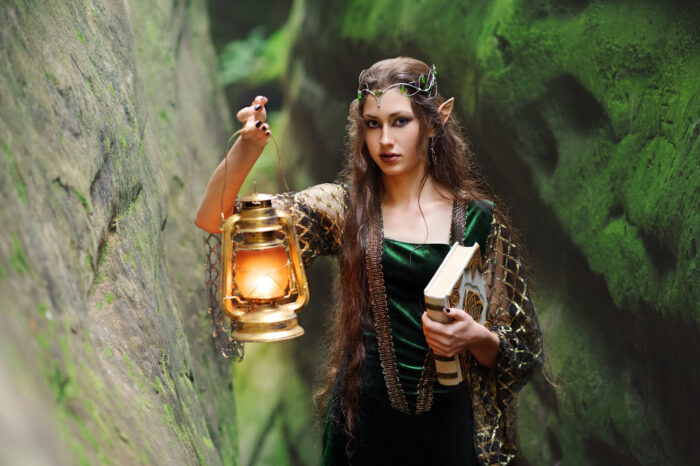51. Do Christians Really Need Fantasy? | Fiction’s Chief End, part 2
Podcast: Play in new window | Download (Duration: 59:34 — 55.9MB) | Embed
In our last episode, we explored the fact that Christians actually need fiction as part of our daily lives. However, we could stop there and presume that we only need “realistic” stories, such as historical or contemporary fiction. Instead, we’ll explore how Christian readers also benefit from fantasy stories, so much that we could also say that we need stories about fantastical other worlds, in order to pursue our chief end of glorifying Jesus and enjoying him forever.
- By “chief end,” we mean our highest purpose in God’s true story.
- The phrase comes from the Westminster Shorter Catechism:
Q: What is the chief end of man?
A: Man’s chief end is to glorify God, and to enjoy him forever.
- This famous quote is like the answer to the Ultimate Question.
- It’s a foundational truth behind everything today and in this series.
Introduction to why Christians need fantastical imagination
A few biblical texts seem to warn against fantasy.
“As I urged you when I went to Macedonia, remain in Ephesus so that you may instruct certain people not to teach false doctrine or to pay attention to myths and endless genealogies. These promote empty speculations rather than God’s plan, which operates by faith.”
—1 Timothy 1:3–4, CSB
“But have nothing to do with pointless and silly myths. Rather, train yourself in godliness.”
—1 Timothy 4:7, CSB
But do these passages mean we should not read fantasy stories?
- Are novels on the same level as Scripture’s “silly myths?”
- Other Scripture texts seem to endorse fantastical imagination.
- We read the Bible by God’s (and human authors’) intent. Including genre.
- Scripture has fantastical flourishes that describe real truths we must believe.
- Examples: Jesus’s parables, prophecy like Daniel and Revelation.
- Judges 9:7–15, Jotham tells a “fairy tale” about talking trees to Shechemites.
Some defenses about fantasy seem extra-biblical.
- For example, it’s not good enough to say, “well, fantasy is in the Bible.”
- I mean: God, not us, could have prerogative to write about miracles/worlds.
- It’s also partial answering at best to talk about how fantasy helps people.
- It’s also not enough to approach this from a secular/human/literary view.
- Even our frequent Lewis/Tolkien quotes can err on side of human reasoning.
To freshen this topic, today we’ll explore it this way:
- Fantasy trains us to imagine God and his true story.
- Fantasy trains us to imagine Jesus and his heroism.
- Fantasy trains us to imagine our world and its peoples.
Concession stand
- We’re actually going to minimize the Lewis/Tolkien quotes in this episode.
- They’re all right, of course. But we’d like to take a fresher approach.
- We’re not exploring specific issues of fictional magic. Already done that.
- Also, note our emphasis on God’s glory as the chief end of every person.
- Our highest human purpose is not entertainment, evangelism, edification.
- Other episodes defend this statement biblically. First things must go first!
- We defend all fantastical stories, including (not limited to) fantasy proper.
1. Fantasy trains us to imagine God and his true story.
- God is utterly fantastical. Only the fantastical can best show Him.
- Scripture itself is fantastical in genre. That’s how we look at the world.
- If we’re being biblical, we don’t view God in “normal fiction” imaginations.
- God is supernatural. Thus, supernatural fiction helps us “train” to image this.
- This training is essential for the Christian. It’s a need, not an optional want.
- We must not only believe God exists, but we seek to know him personally.
- God is not confined by space, bound by time, or restricted by any of the laws of physics.
- He can’t be controlled, won’t be bribed, and nothing can thwart his purposes.
- The fantastical creatures in stories, even the final boss monsters, pale in comparison.
To do theology, the study of God, you need fantastic imagination!
- Scripture’s truth must shape our imagination. Stories help us train for this.
- We must imagine not only God but his story: the fantastic gospel.
- Others speak truth: the gospel is the ultimate fantastical “monomyth.”
- Other stories, including contemporary/historical/etc., are in a fantastic world.
- Fantasy is the genre over all genres, because only fantasy is our world.
2. Fantasy trains us to imagine Jesus and his heroism.
- Heroes in fantasy (not just general fiction) behave in super-human ways.
- I don’t mean superpowers. It’s humanity “exaggerated.” Heroes, villains.
- These traits remind us of Jesus, the ultimate Man, God-become-Man.
- We needn’t only talk about Aslan. I love Aslan. He’s archetypical.
- But any good human fantasy hero, on a journey, reminds us of Jesus.
- When we let go of ourselves, “serving” a hero in our imagination, we train.
- We aren’t chiefly seeing ourselves in the story. We’re becoming humble.
- This is unlike some fan-perversions of story, using them as self-insert spaces.
- Good readers don’t project themselves atop characters. We learn from them.
To imitate Jesus as commanded, we need fantastic imagination!
- Based on Scripture’s truth, we must imagine truthfully Jesus and his gospel.
- Real-world people in our fantastic world help us. So do fantasy heroes.
- Good-versus-evil tales in fantasy more closely approach the gospel.
- And, as Zack explores at Lorehaven, fantasy villains can also warn us.
“Fairy tales are more than true: not because they tell us that dragons exist, but because they tell us that dragons can be beaten.”
—Attributed somewhat incorrectly to G. K. Chesterton, by Neil Gaiman in his epigraph to Coraline
“Fairy tales do not give the child his first idea of bogey. What fairy tales give the child is his first clear idea of the possible defeat of bogey. The baby has known the dragon intimately ever since he had an imagination. What the fairy tale provides for him is a St. George to kill the dragon.”
—G. K. Chesterton, “The Red Angel”
3. Fantasy trains us to imagine our world and its peoples.
- What about after we truthfully imagine God, the gospel, and Jesus?
- Fantasy comes closest to helping us imagine our real, fantastical world.
- Here we could refer to Lewis/Tolkien quotes about wonder and such.
- Yet even those quotes out of context may treat “wonder” as its own end.
- Our God has sent us into the real world on gospel mission for our Hero.
- His calling isn’t just for us to make great stuff. It’s to make disciples.
- He wants us in him to train for resurrection from dead, corrupted humanity.
- To paraphrase N. D. Wilson: “Fantasy is simply fan fiction of God’s story.”
To regain/reach humanity, we need fantastic imagination!
- Stories help us not only follow our Hero, but see our own natures anew.
- We see how we’ve suffered: our trauma, our corruption, our consequences.
- Stories train us to be empathetic. We imagine not just Jesus but each other.
- So now I can humbly, rightly imagine myself as another person, in the world.
- General fiction also helps. But in a fantastic world, fantasy is more realistic.
- With fantasy, the genre of genres, I can see the world in different, truer ways.
Fantastical fiction is the best way to impart memorable truth about reality.
- When we enter into a fantastical world beyond our normal experience, we immediately look for and grasp what is familiar.
- We latch onto the behaviors and beliefs of the characters––human, alien or otherwise––and reflexively compare them to ourselves.
- The very strangeness of spec-fic therefore acts like a giant microscope on our own human nature.
- Jotham’s story of the talking trees in Judges 9:7–15 is a fascinating portrayal of the motivations and consequences of his people.
- We can create stories of things that can’t happen (not just things that didn’t happen) in the service of communicating a greater truth.
- Jonathan Rogers: “Imagination stretches us into what we long for.”
“I met a man the other day who did not believe in fairy tales. … He actually thought that fairy tales ought not to be told to children. … The man had come to see me in connection with some silly society of which I am an enthusiastic member; … ‘Man,’ I said, ‘who are you that you should not believe in fairy tales? It is much easier to believe in Blue Beard than to believe in you. … It is far easier to believe in a million fairy tales than to believe in one man who does not like fairy tales. … Folk-lore means that the soul is sane, but that the universe is wild and full of marvels. Realism means that the world is dull and full of routine, but that the soul is sick and screaming. The problem of the fairy tale is—what will a healthy man do with a fantastic world? The problem of the modern novel is—what will a madman do with a dull world? In the fairy tales the cosmos goes mad; but the hero does not go mad.'”
—G.K. Chesterton, The Dragon’s Grandmother
Fantastic fans
John B. wrote in response to episode 50:
Hey guys!
I loved the topic and discussion in episode 50. (congratulations!) It reminded me of a conversation I had that’s worth sharing.
Some time ago I was lamenting to a friend how I wanted my kids to read more and fight their strong attraction toward online games. He said that he didn’t see much difference; One of his children was an online gamer, the other was an avid reader and both options used up hours of their time and was done alone.
His pushback made me consider why I felt that reading was superior. What I ‘found’ was this: Fiction uniquely invites us to become co-creators.
An author creates a framework of place, person, and plot but as the reader I must create the images and textures of that world in my mind, entering into the creative process. That imaginative responsibility makes the story more powerful and personal, as most creative acts do. And, because it’s co-creative, it’s never really done alone. Reading is always collaborative—even if the author’s framework must wait in time and space until I join in with my imagination.
Certainly other story forms involve creativity on my part, even video games, but I can’t think of anything that invites me to such a high level of collaborative world-building than a good work of fiction.
(And isn’t that the world we’re actually living in? God as author spoke our world into being and invited us to take the framework he’s given us, filling it with good things by way of our image-bearing creativity.)
Next on Fantastical Truth
We’ve explored fiction’s chief end, and now fantastical fiction’s chief end. Now, what about a genre within what we’d call fantastical stories: the specific genre of science fiction? These stories often imagine visions of our own world, and sometimes that’s a world that not only ignores these traditional fantasy images but ignores the existence of God—or even uses technology or theories to explain otherwise supernatural themes. We will explore why Christians may actually need science fiction, just like we need fiction and need fantasy.






































Totally agree with your first point – I was able to understand God’s sovereignty and human freedom as God being on a different plain to our human existence, and I feel like I got that idea from watching Star Trek with Mum!